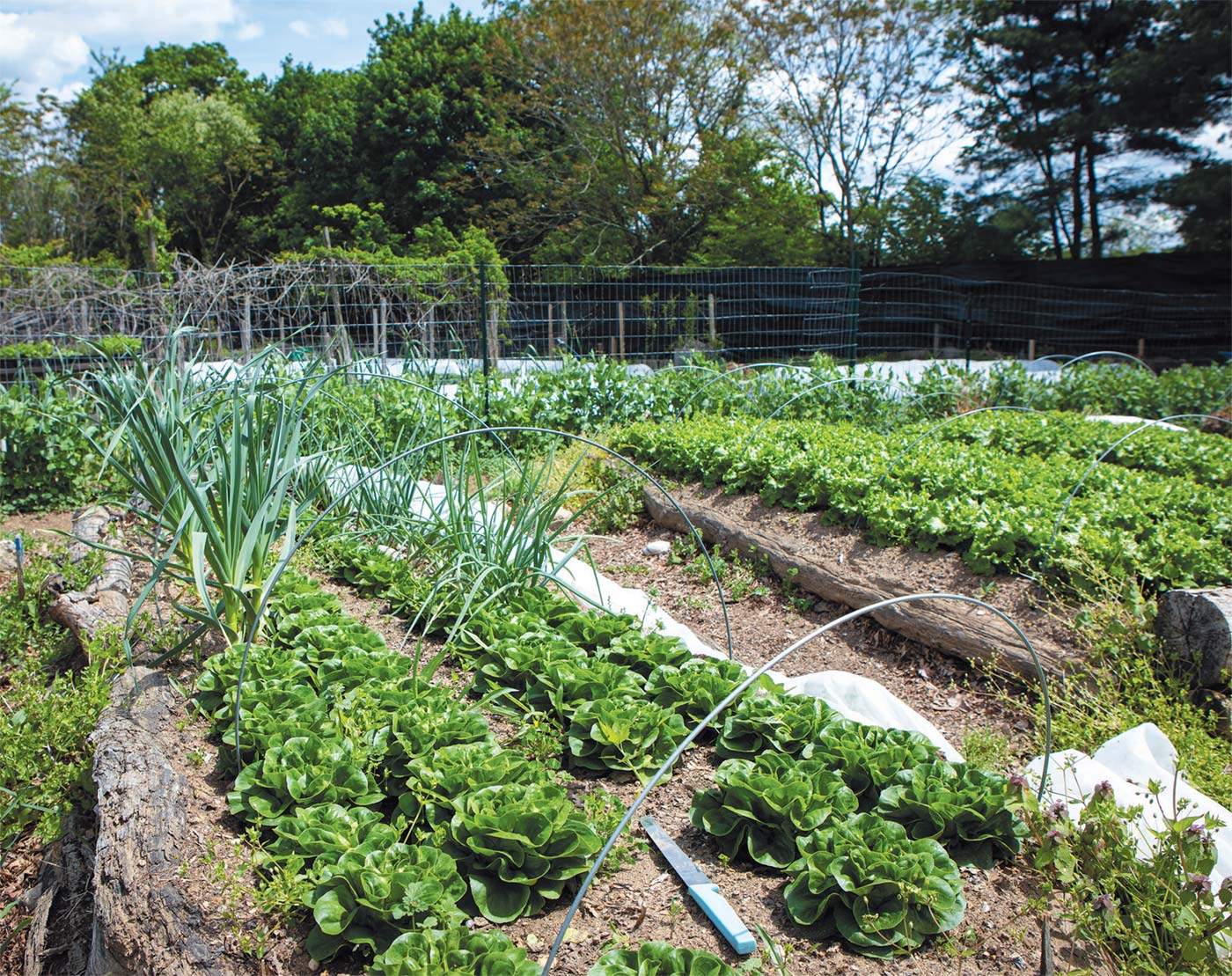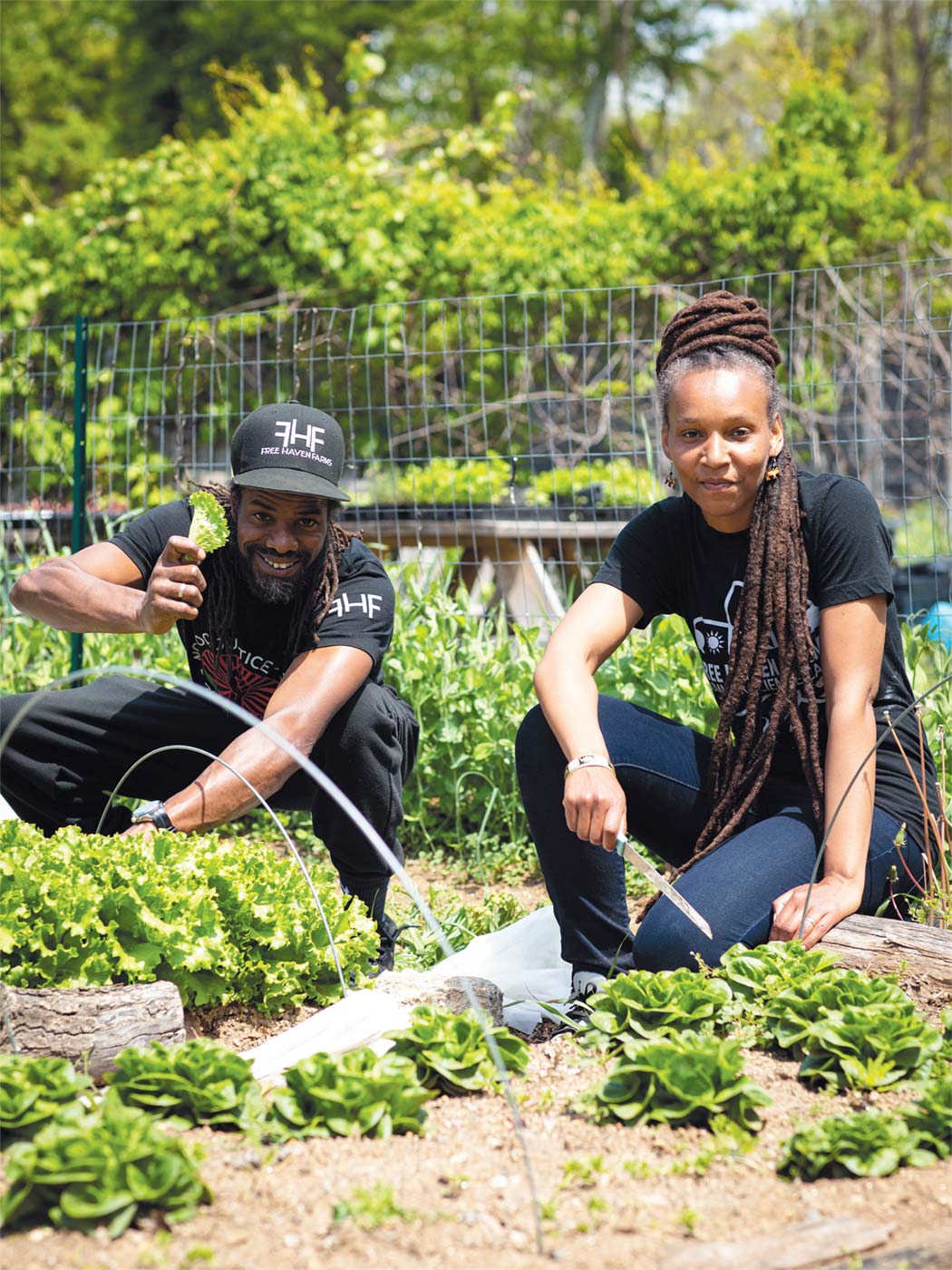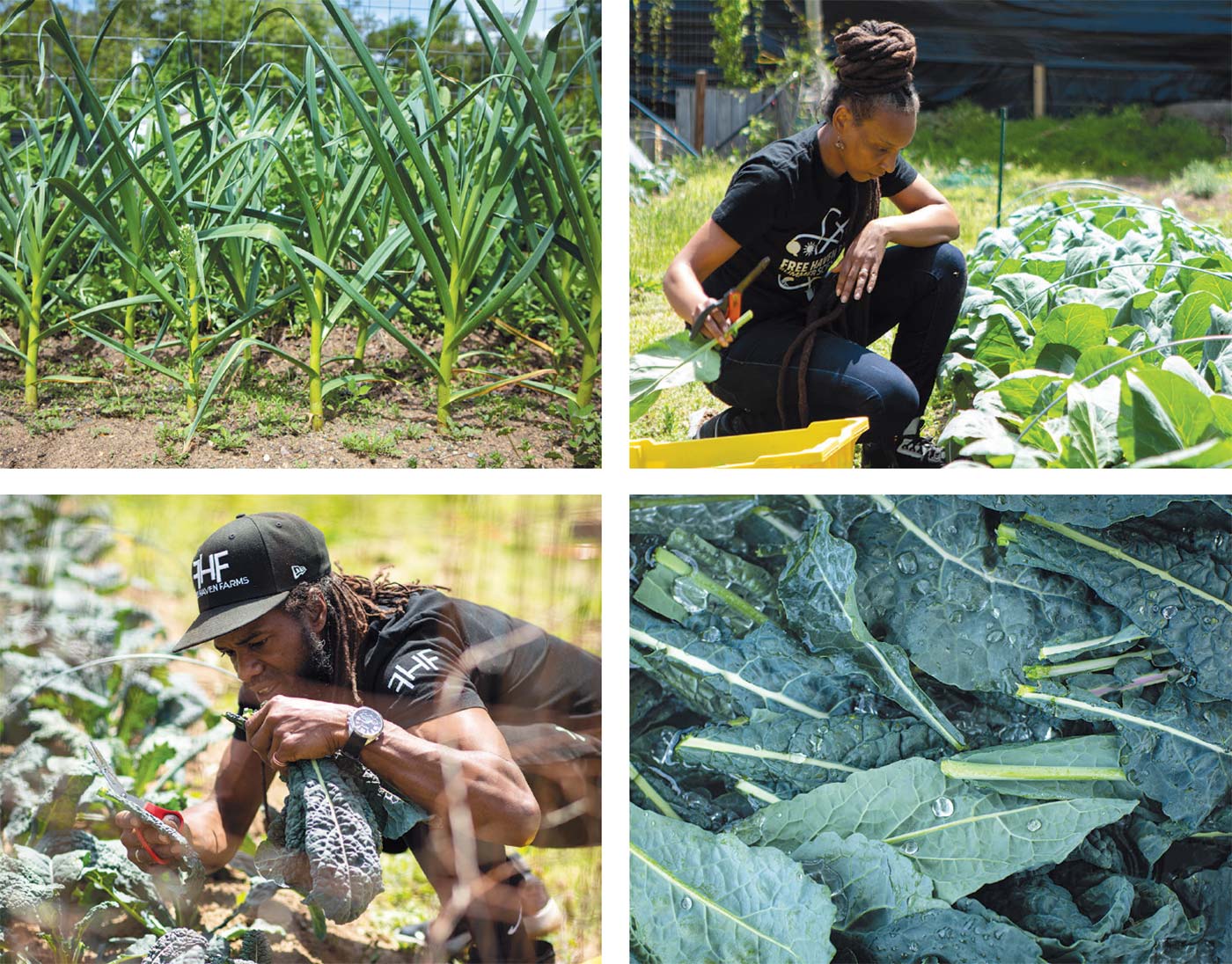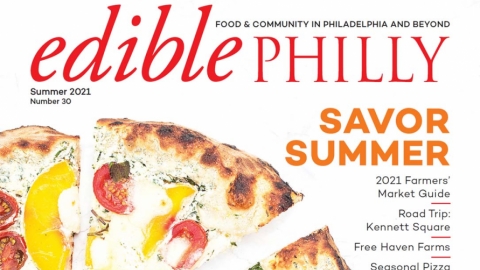Growing Sustainability and Social Justice at Free Haven Farms

A passion fruit, coconut water, and sea moss smoothie sounds like something straight out of goop, but the man drinking (and Instagramming) it could not be any less like Gwyneth Paltrow. At 44, Micaiah Hall is four years younger than the actress and lifestyle maven, though his dark beard has a distinctive white patch. He’s lean but fit, though it’s hard to tell under the hoodie-and-overalls combo he favors. He wears his hair in dreadlocks, which he frequently tucks under a baseball cap emblazoned with the logo for Free Haven Farms, the unlikely Camden County property where he and his soil scientist wife, Cynthia, grow food for much of the surrounding area—that is, when they’re not teaching people how to grow it themselves.
The Halls are hardcore believers in organic, sustainable agriculture and healthy living, so much so that they’ve built a mini empire around the concept. They run workshops on everything from growing mushrooms to soil irrigation, give regular farm tours of their one-acre property to the public, offer fitness classes including yoga and the Afro-Brazilian martial art known as Capoeira Angola, have their own CSA and small-batch hot sauce line, even run a summer science camp for kids. They were the first of five local growers who signed on to provide fresh produce to Virtua Health for their “Eat Well” program, and when we spoke Micaiah had just self-published his first book, Farmalosophy (he refers to himself as “The Farm Assist”), and was already working on a cookbook. He glancingly mentioned having recently met with Senator Cory Booker about the Justice for Black Farmers Act, legislation to correct systemic discrimination and encourage a new generation of Black farmers.
According to the bill, the United States had nearly one million Black farmers in the 1920s; today, there are fewer than 50,000. As one of those still farming, the Halls realize that they need to educate people on a lot more than just soil quality. “You don’t see a lot of Black faces in the farm game,” Micaiah says. Part of bridging that gap, he and Cynthia realized, was simply showing people that it could be done. “If you can’t show people success, you can’t get people to sign up for it,” Micaiah says. “We know that our work is bigger than us.”


Micaiah and Cynthia Hall harvesting vegetables on their Camden County farm.
EARLY GROWTH
Micaiah has been growing his own food since he was 7 years old. Witheight kids in the house and not a lot of money, he says, gardening was a way to subsidize the family grocery bill. He took to it, and landed his first job at age 12 working on a 16-acre farm in Connecticut. He drove a tractor before a car.
Though he eventually went into plumbing as a profession, he circled back to his gardening roots after marrying Cynthia. They had their first child while she was still studying geochemistry at Georgia Tech in Atlanta. “We were a young family, I was a grad student, we wanted to eat organic but we were struggling financially,” she recalls. So Micaiah planted a garden. “It was originally just to eliminate our grocery bill,” Cynthia says.
Her career eventually brought them north, and they settled in a West Philadelphia row home—not exactly a hot spot for subsistence farming. But Micaiah, she says, “still made it grow.”
“They say planting is planning,” he says. “You can grow a lot in a small space. And when you grow in accordance with nature, things grow really abundantly.” He estimates that he produced between 7,000 and 10,000 pounds of food each year on their quarter-acre lot.
Everything the family didn’t eat was sold at what Micaiah calls “farmers’ markets in the ‘hood.” It was often the only access to fresh produce within walking distance for a lot of the local neighborhoods. Micaiah had also gotten a job at Mill Creek Urban Farm in West Philly, which opened his eyes to a lot of issues surrounding food insecurity and access for inner city communities.
“We spent more time answering questions than selling vegetables,” he says. “In these communities, health issues like diabetes, obesity, cancer rates, they’re three times higher than average. And a lot of those health conditions, we realized, are connected to diet. Our great-grandparents weren’t dealing with the same ailments that we are in our generation because they ate differently. Nutrient content and food quality has gone down.”
Micaiah dislikes the term “food desert,” preferring to call places like these “food mirages” because, in his words, “the food that is available is toxic.” “It’s not even that healthy food in the grocery store is overly expensive, it’s that the other stuff is overly cheap,” says Cynthia.
After hearing the same questions from farmers’ market customers over and over—mostly, “What is this?” about vegetables like Swiss chard and “How can I cook this to be healthy?”—the Halls realized that education was key. “There’s this huge knowledge gap about where food comes from,” Cynthia says. “Policy isn’t even on the table to change things officially if people don’t even care and they won’t care if they don’t know it exists.”
ONE ACRE AND SOME PULL
In 2017, they set out to change that when they began to farm the one-acre property they had purchased two years earlier in Lawnside, New Jersey, Cynthia’s hometown. They christened it Free Haven Farms after the town’s original name, given to it by the formerly enslaved people who settled there in the 19th century (the town was renamed in the 1920s).
“We wanted to tap into that mind-set, and the idea of bringing people out of mental slavery and toward a healthier and better quality of life,” says Micaiah. “There is a lot of trauma with Black people in the U.S. doing farming because of ties with slavery. That connection has to be severed. We need to create a new narrative. It’s not about our labor and our oppression. Every civilization in this world developed from agriculture.”
Though the farm isn’t sprawling by any means, Micaiah drew on his row home gardening experience to maximize the space they have. He grows “a lot of leafy greens, kale, collards, lettuce, all that good stuff,” plenty of herbs, and in summer, the crops New Jersey is known for: peppers and tomatoes. The produce is grown free from commercial pesticides and while it isn’t certified organic—the certification process can be particularly tricky for small producers—Micaiah says, “Our standards are even higher.”
But growing is only half of Free Haven’s “sustainable and attainable” mission. “Fifty percent or more of our work these days is educating people,” he says. Their classes expose people, many of whom have never been on a working farm before, to the basics of planting and harvesting. “Being educated about how to grow food is important economically and for your health,” Micaiah says. “When you grow food, you have a better chance of eating it. And you’re outdoors, connecting with nature, all those side benefits.”
In addition to weekly classes at the farm (currently streaming due to Covid-19 restrictions) and monthly workshops, Free Haven has partnered with Roots to Prevention (RTP), a Camden- based organization whose mission is to connect low-income communities with fresh, healthy food (see sidebar, p. 43). The Halls did a video class they called Root Camp to teach Camden residents how to grow their own food.
“Camden is a unique city,” says Jonathan Wetstein, program manager for RTP. “Until a few years ago, it had the highest number of urban farms per capita of anywhere in the country.” The city’s adopt-a-lot program helped kick-start the movement in the mid 1980s by providing land; today, RTP and its partners offer residents everything else they need to get started, from soil and seeds to a tool library. And of course, Free Haven helps provide the know-how.
“Awareness is going to force change,” says Cynthia who, along with her role at the farm, serves as an adjunct professor in the Department of Earth and Space Sciences at West Chester University. “Health is a human thing. It affects all of us.”
RTP is also pioneering an initiative with Virtua Health to have local growers provide fresh produce for food-insecure patients. Free Haven was the first farm they signed on. “Fresh produce is not always available at the corner grocery store,” says Wetstein. “This is one of only two programs in the country that I’m aware of where the health system is purchasing that produce from residents.”
One of the biggest obstacles, he says, was simply “boots-on-the- ground technical expertise.” “We struggled to find really good role models in urban agriculture who look like the populations we help,” says Wetstein. And that, he adds, is key for recruiting the next generation of city farmers. “If youth don’t see anyone they know doing this, it’s not a priority.”
“Having representation of Black farmers in a Black community is important,” Micaiah says. “We can’t expect other communities to solve our problems.” Having struggled through getting a microloan from the USDA to purchase Free Haven, the Halls are acutely aware of the challenges facing farmers, and are prepared to lead by example. “We are farmers and we are Black, and we are proof that you can be successful and happy and raise children doing farming as a profession,” Micaiah says. “We want to use that authenticity to create opportunity for those who come after us.”
All three of the Halls’ children have grown their own food from day one. “People say you can’t do it, but you can, and you don’t have to be a weirdo to do it either,” Micaiah says. “We are spreading that message that no matter where you are, you can grow food.”
- Learn more at freehaveneducationalfarms.com
ROOTS TO PREVENTION
Free Haven Farms has partnered with Roots to Prevention (RTP), a Camden-based organization whose mission is to connect low-income communities with fresh, healthy food, on a number of initiatives, including a pioneering program with Virtua Health.
A NEW PATH TO HEALTH
As the role of diet in so many chronic diseases continues to come to light, more healthcare systems are treating food like medicine and prescribing fresh fruits and vegetables to patients. Providers including Virtua Health are also making efforts to provide these foods to the community at no or reduced cost.
That has spiked demand for locally grown produce, says RTP program manager Jonathan Wetstein. While other health systems’ programs strive to provide quality food with initiatives such as running urban greenhouses, “Virtua is one of a handful that are purchasing locally sourced,” says Wetstein. “With this [Virtua] partnership, we went from maybe a thousand pounds of demand to thousands of pounds of demand overnight.”
To meet that demand, RTP and Virtua are hiring and training apprentices at garden centers within a half mile walk of urban centers, launching mobile “farm trucks” and establishing eight garden hubs around the city by the end of this year where anyone who is interested can pick up a starter kit with seeds, soil, and instructions to get started. “We believe urban agriculture can play an integral role in healthcare,” Wetstein says.
- For more information visit rootstoprevention.com/roots-to-market.






